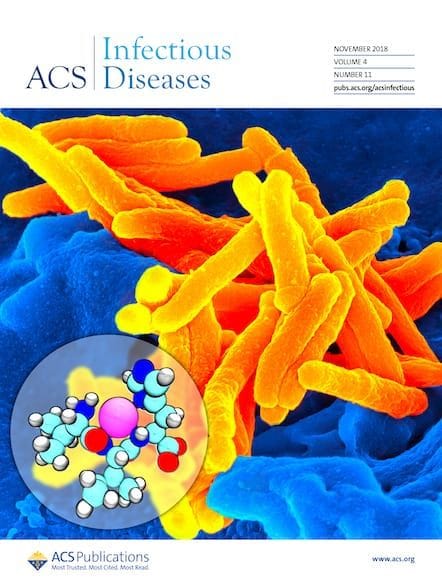Microorganisms are Earth’s oldest life forms and have come to inhabit virtually every location on the planet. Recent advances in technology have enabled researchers to dissect how microorganisms interact with their surroundings. These investigations reveal that microorganisms exist in complex communities commonly referred to as “the microbiome.” These microbial communities have been found to be […]

These microbial communities have been found to be integral to many processes, including human and animal health, and environmental nutrient cycling. In light of our growing appreciation of the importance of the microbiome, ACS Publications began a three-part webinar series on July 26 exploring how chemists are studying this important topic.
Part 1: The Microbiome and the Environment
In this first webinar in the series, The Microbiome and the Environment, sponsored by Environmental Science & Technology and Environmental Science & Technology Letters, Dr. Ariel Grostern, Managing Editor of Environmental Science & Technology, Environmental Science & Technology Letters, and Journal of Agriculture and Food Chemistry, led Dr. Lutgarde Raskin, Altarum/ERIM Russell O’Neal Professor of Environmental Engineering at the University of Michigan, and Dr. Tong Zhang, Professor in the Environmental Biotechnology Laboratory in the Department of Civil Engineering at The University of Hong Kong, in a discussion of the role microorganisms play in the urban water cycle. Dr. Raskin and Dr. Zhang explained how molecular biology is providing insights into the complex microbial communities of wastewater treatment plants and the spread of antibiotic-resistant genes.
If you missed the live webinar, you can watch the recording complete with Dr. Grostern, Dr. Raskin, and Dr. Zhang’s slides any time. Just register here anytime.
Part 2: Microbiome Technologies
This second webinar in the series, Microbiome Technologies, is sponsored by ACS Nano and Analytical Chemistry and will address the role of the microbiome as it pertains to technology. The extraordinary measurement and manipulation requirements of studying the microbiome open up great opportunities for chemists, nanoscientists, and other researchers. These broad needs include the ability to eavesdrop on chemical communications, conduct massive multimodal data science, and develop synthetic biology- and mass spectrometry-based tools to manipulate organisms and populations. This webinar will provide an overview of the function of these technologies and discuss challenges and areas for investigation in these technologies.
Date: Thursday, Aug. 11
Time: 11:00 a.m. EDT, 10:00 a.m. CDT, 8:00 a.m. PDT
Key Learning Objectives:
- Describe the importance of microbiome technologies.
- Identify challenges associated with these technologies.
- Explain how to study these technologies using nanoscience, nanotechnology, and mass spectrometry.
Moderator: Laura Fernandez, Managing Editor of ACS Nano and Nano Letters
Speakers:
- Pieter Dorrestein, Professor at the University of California, San Diego; Director of the Collaborative Mass Spectrometry Innovation Center; and a Co-Director of the Institute for Metabolomics Medicine in the Skaggs School of Pharmacy & Pharmaceutical Sciences, and Department of Pharmacology
- Paul S. Weiss, Editor-in-Chief of ACS Nano; Distinguished Professor of Chemistry & Biochemistry, Distinguished Professor of Materials Science & Engineering, California NanoSystems Institute, University of California, Los Angeles
Part 3: The Microbiome in Health and Disease
This third webinar in the series, The Microbiome in Health and Disease, is sponsored byACS Infectious Diseases and Journal of Proteome Research and will address the microbiome’s critical role in maintaining health and preventing disease. The gut’s microbiome plays an integral role not only in maintaining metabolism but also in providing a barrier against infectious disease. This webinar will offer an overview of the microbiome’s function in these aspects of human health and discuss in detail challenges to investigating the subject and various approaches to overcoming them. Attendees will learn about opportunities for chemists and chemical biologists in this research area.
Date: Tuesday, Aug. 16
Time: 11:00 a.m. EDT, 10:00 a.m. CDT, 8:00 a.m. PDT
Key Learning Objectives:
- Describe the importance of the microbiome as it pertains to infectious disease.
- Identify challenges associated with studying the subject.
- Discuss the effect of the colon’s microbiome on metabolism.
- Outline cloud-based XCMS global metabolomics for microbiome analyses.
Moderator: Kristen Kindrachuk, Managing Editor of ACS Infectious Diseases,ACS Medicinal Chemistry Letters and Journal of Medicinal Chemistry
Speakers:
- Gary Siuzdak, Professor of Chemistry, Molecular and Computational Biology at The Scripps Research Institute and Senior Director of the Scripps Center for Metabolomics
- Emily Balskus, Morris Kahn Associate Professor of Chemistry and Chemical Biology at Harvard University
The Microbiome: An ACS Infectious Diseases Special Issue
Dr. Balskus is also the Guest Editor for an upcoming special issue of ACS Infectious Diseases titled The Microbiome. The issue is scheduled for publication in 2017 and the journal is accepting manuscripts until Oct. 1, 2016.
Submit your research on the microbiome today!
Tweet about these webinars, the ACS Infectious Diseases special issue The Microbiome, and the topic in general using the hashtag #ACSmicrobiome.
